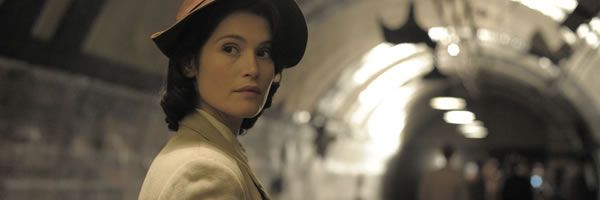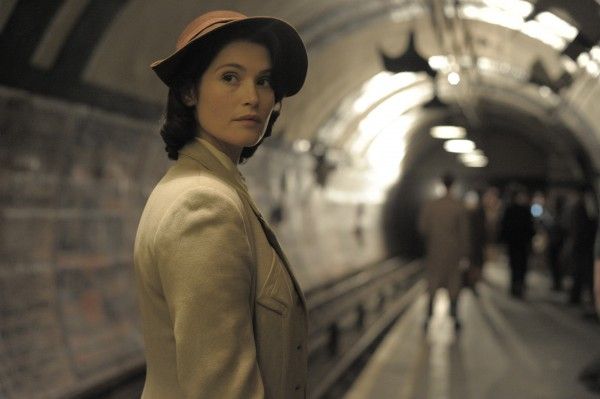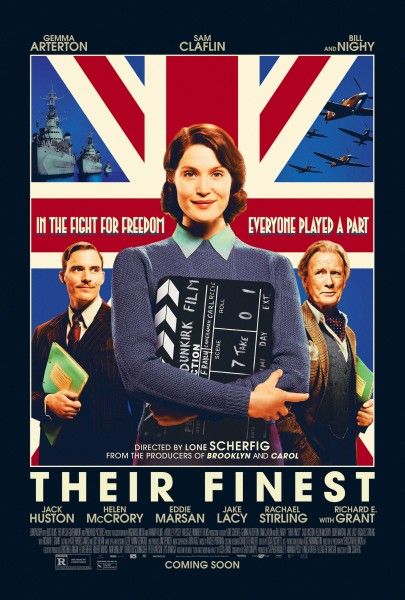[This is a re-post of my review from the 2016 Toronto International Film Festival. Their Finest opens in limited release on Friday.]
For its first two-thirds, Lone Scherfig’s Their Finest is a delightful, sharp celebration of a woman going into a man’s world and finding that she’s a talented asset who’s serving not just art but her country. It’s uplifting, it’s funny, it’s smart, and it’s a damn shame to see it fall apart so easily to the point where you wonder if Scherfig and writer Gaby Chiappe are making a meta-commentary on how romances are forced on female characters rather than just letting them be heroes. Instead, Their Finest becomes emblematic of the problem it wants to address, and the hard work that went into the beginning of the movie dissolves into cheap sentiment.
In 1940 London, writer Catrin Cole (Gemma Arterton) goes to work for the Ministry of Information in the Film Division. The Ministry is looking for films that will provide “authenticity and optimism” and writer Tom Buckley (Sam Claflin) believes that Cole is a good candidate to handle “the slop”, i.e. dialogue for female characters. Cole comes across a true story of two sisters who tried to use their father’s boat to save the soldiers stranded at Dunkirk. The engine stalled out before they were even out of British waters, but that’s small matter to Buckley and his boss Roger Swain (Richard E. Grant). The uplift is what counts, and together with Catrin, they set to work on making a proper propaganda film to lift the country’s spirits and possibly get America to join the war effort.
Up until it shifts gears and tries to be a romance, Their Finest is a crowd-pleasing piece of feminist filmmaking. The more the movie invests in Cole’s career, the more interesting it becomes, and the more we can see it reflected in today’s current environment with how female roles are treated. Early in the film, Cole and Buckley argue over who should get to save the boat when the engine stalls in enemy waters, and Buckley forcefully advocates that it should be Johnny, the heroic male soldier, even though the sisters are the protagonists. It’s a wry comment on how women don’t get to be the heroes in their own stories.
Even though the film mostly keeps an upbeat tone and it’s fun watching Cole and Buckley bounce plot ideas off each other, it never forgets the larger war that’s happening around them. In one scene, Cole is walking down the street when a bombing raid hits. She survives, and when she looks at the street, she thinks it’s covered with bodies, but it’s just mannequins that have been blown out of shop windows. But further down the road, she comes across a real body. The horror of war is turned into a daily reality that no one, not even the film’s comic relief and strongest aspect, arrogant has-been actor Ambrose Hilliard (Bill Nighy), can escape.
The movie also makes a strong case for the role of propaganda. While the term “propaganda” is usually an ugly word, Their Finest repositions it as a weapon, and like any weapon, it can be put to good use if it’s placed in the right hands. It’s enjoyable watching the Ministry try to construct their film for maximum effect and reach even further when given the opportunity to appeal to America by casting a real American hero, Carl Lundbeck (Jake Lacy). Their Finest is a big fan of the filmmaking process, and it’s a fun ride while it’s following Cole’s growth in the film industry.
But near the end, Their Finest becomes a completely different film, and a far worse one. Until the third act, the relationship between Cole and Buckley was professional with maybe some romantic undertones, but presumably those wouldn’t get played upon because Cole is married. The movie then does backflips to try and undo the marriage, give Cole a moral out, and then set her up with Buckley all in the span of about ten minutes. I don’t want to spoil anything, but it gets worse from there, and it’s maddening to see Scherfig turn a story about a strong, career-minded woman into a gooey, unearned romance.
Even though Their Finest falters at the end, it’s still a mostly pleasant film featuring charming performance and some thoughtful subtext. It’s a bit surprising that it falls apart so easily, and if this were a Hollywood movie, I would just assume that test audiences or studio execs demanded the sappy romance to take over. Perhaps Scherfig got too clever by half and thought that she could better make her point by turning her movie into a reflection of that point, but instead it makes the picture feel hypocritical and oblivious. Their Finest is a fine film until it’s not.
Rating: B-



